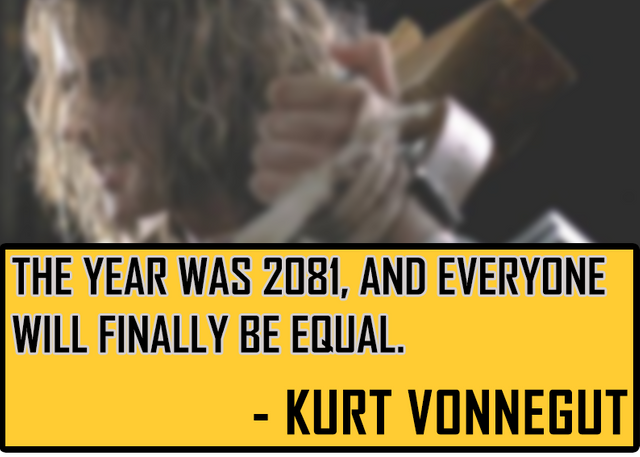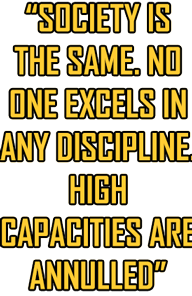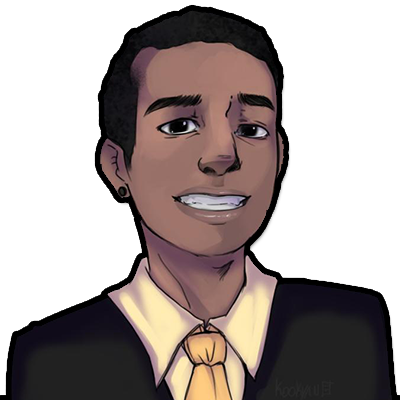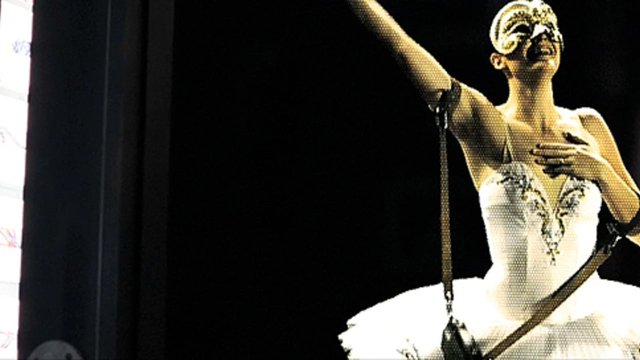
I recently saw a little gem of a short film called 2081, a Rawlsian dystopia that describes a society where "everyone is equal".
While I was watching this short film It reminds me of John Rawls' Theory of Justice, this scholarly hymn to egalitarianism and the institutionalized jealousies written in 1971. How can one portray, in images and sounds, his affirmation and his perverse principles?
The film, directed by Moving Picture Institute, produced by Thor Halvorssen and written and directed by Chandler Tuttle, is inspired by a story by Kurt Vonnegut, Harrison Bergeron. Like any short film, 2081 should not be taken literally.
In 2081, exceptionally gifted, beautiful, strong, intelligent individuals "match" their moderately gifted peers with a series of paralyzing objects - weight, masks and taser-like devices that interrupt thinking and hinder movement. Anyone tested by the state and considered above average in any field is legally required to be equipped with one or more of these devices, known as "equalizers. Removing them can take you to prison.
George Bergeron Harrison's son was arrested and imprisoned for six years for refusing to use "equalizers" and for "allegedly removing them in public". "He escaped from prison and appears in a concert hall that plays Tchaikovsky's ballet Sleeping Beauty. The ballet is broadcast on national television. Dancers are also hampered by weights that make their movements uncomfortable. Harrison announces to the audience that he has planted a bomb under the room. He claims, among other things, that he is "an exception to the rule," and that he "was not created equal," and removes all the devices that his body had to endure, including a yoke installed on his shoulders and neck.
This is what freedom is all about. He's crazy... or perfectly lucid. He does not wish to continue living in a world of "egalitarianism" and "original positions"[the latter concept was coined by John Rawls in Theory of Justice ]. It is up to the spectators present to judge. Then invite a volunteer to imitate him. One of the dancers advances and drops her weight as well.
At the same time, the US General Disability' intervention teams surround the room, defuse the bomb (we do not know whether it was a real bomb, I do not think, but this is only conjecture), and prepare to capture or kill the public threat'. The authorities ordered the broadcast to be stopped, but Harrison Bergeron implemented a device that replaces the signal and allows the program to continue broadcasting (reminiscent of the dissemination of John Galt's speech in Ayn Rand's Atlas Rebellion). While Harrison Bergeron and the dancer perform with complete freedom of movement and a melancholy performance in front of an astonished audience (many of whom also use "equalizers"), the intervention teams move around the room.
A silent, expressionless woman, who is in charge of the operation, takes a gun and kills Harrison Bergeron and the dancer. The action is televised without his knowledge and one of the last things we see is his slightly surprised face, with his eyes on the camera field. That's what Harrison wanted the country to see: the expressionless face of evil. End of transmission. The public enemy has been eliminated. Circulate, nothing to do with it.
George (also hampered by "equalizers"), saw all this in the comfort of his living room, while his "complacent" wife, Hazel, was convincingly interpreted by Julie Hagerty (who does not use an "equalizer" because she has no extraordinary or exceptional quality), did not see the events on the TV screen. She washes the dishes, with her back to the screen, and misses the whole show, and a final image of her son, the sound of the current that acts as an "auditory equalizer" for her.
When George began to think about his son's arrest at home years ago, and began to respond to his son's performance and heroism, his hearing aid was altered by his hearing aid. His wife asks him why he looks so upset. He can only answer that he saw something "sad". He can't remember what. You forget what you saw in front of your TV, because of the machines that control your mind.
The film addresses many questions to us.
What is equality? Is equality possible? Is equality desirable? What does justice mean?
Let's think for a moment about how unfair it is that there are women who are more beautiful than others, it is very positive for the beautiful woman, but what about the less beautiful? What's her fault for not being so pretty? Isn't that unfair?
And what to say about one man who is stronger than another is a terrible thing, for one person could force himself on another. It's definitely not fair.
But perhaps the worst thing is people who are more intelligent than others, let's imagine just for a moment the excesses that a person with a higher mental capacity can cause to people with a less fortunate brain, totally unjust.
What would be the answer for all of that? to create a society where justice means equality?
These are some of the aspects that we see in this short film.

Society is the same. No one excels in any discipline. High capacities are annulled, so that all people will have diminished capacities, forming a highly manipulable society.
This film takes a classic utopia (equality between human beings) and evolves it into a nightmarish dystopia. A classic in the genre that manages to pervert utopias by taking them literally or taking them to the extreme.
The film lasts only 25 minutes, but it slaps as hard as George Orwell's 1984 book. This short film about the price of silence and the fate of those who prefer security and passivity to independence and freedom is one of the best films I have ever seen.
Here's the film:




I think the main philosophical divide in human society today is 'equality of outcome' VS. 'equality of opportunity' ... What exactly those things mean warrants some discussion... I love this short story... never seen it in video form before...
Downvoting a post can decrease pending rewards and make it less visible. Common reasons:
Submit
He's perfectly lucid. The book, Theory of Justice, is in spanish?
Con respecto a la justicia, estoy completamente seguro que es: tener lo que te has ganado. Con respecto a cosas como los dones naturales, es algo que la justicia no puede regir, no tiene dominio allí, es algo al azar (no totalmente claro)
Downvoting a post can decrease pending rewards and make it less visible. Common reasons:
Submit